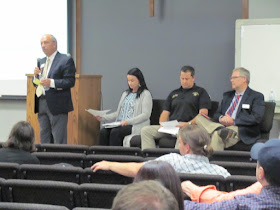By Sarah Owens and Michael Livingston
 |
| Bench tent on Commercial Street, north of Court Street, wk of 9/23 |
Despite prior agreements to coordinate with area homeless services providers, law enforcement did not coordinate and did not even provide advance notice that the actions would be taking place, which obviously limited providers' ability to respond effectively to the sudden increase in demand for services. New commitments to coordinate have been made in the wake of the clean ups. See Bach, J. "Homeless camp sweeps coming to these parts of Salem in October." (29 September 2019, Statesman Journal.)
The clean ups have forced some campers into downtown, but not as many as expected, according to Salem police officer Darren Mumey, who told CANDO in September that he didn't know where the other displaced persons might have gone.
All the above comes as the City Manager reports progress toward the City's "Safe Community" goal as a result of learning from FEMA how to communicate effectively during emergencies and disasters.
"Safe Community" -- could the irony be any greater? Could current circumstances make it any clearer that the City does not view the people living in its streets as "community", much less "safe community"? Or that significant disruptions to their living situations don't require "effective communications" with Salem Housing Authority and other partners like the Mid-Willamette Community Action Agency or Northwest Human Services? Could the City Manager's Office be any more tone deaf?
Sadly, in the past six weeks, these cleanups and the rancorous debate over Sit-Lie, Jr. have completely overshadowed the efforts of area leaders' steady but relatively undramatic efforts to negotiate separation from the Rural Oregon Continuum of Care (ROCC) and re-form a functional regional CoC.
There was another meeting of CoC "stakeholders" on September 19, hosted by Independence City Manager Tom Pessemier and Monmouth City Manager Scott McClure, at the Polk County Fire District #1 station in Independence.
Jan Calvin, consultant to the Mid-Willamette Valley Council of Governments (MWVCOG), shared the latest developments, including the latest "timeline" for implementation and a draft charter for the Development Council, which has been formed to oversee the creation of the new CoC.
The first meeting of the Development Council (DC) was held the following week, on September 24, at the MWVCOG office on High Street. If you think the DC looks like an expanded version of the Mid-Willamette Homeless Initiative Steering Committee, you're right.
And here it must again be observed that, even as there is this momentous Homeless Alliance forming with the purpose and intent of implementing the most effective, evidence-based policies and practices available to address a burgeoning crisis in the community, the City of Salem is pulling in the opposite direction with its anti-homeless "Sidewalk Behavior Ordinance" -- and no one on the DC dare say anything about it, least of all those who understand best that enactment will only make things worse. That's how good, and bad, things are right now in the continuum.












